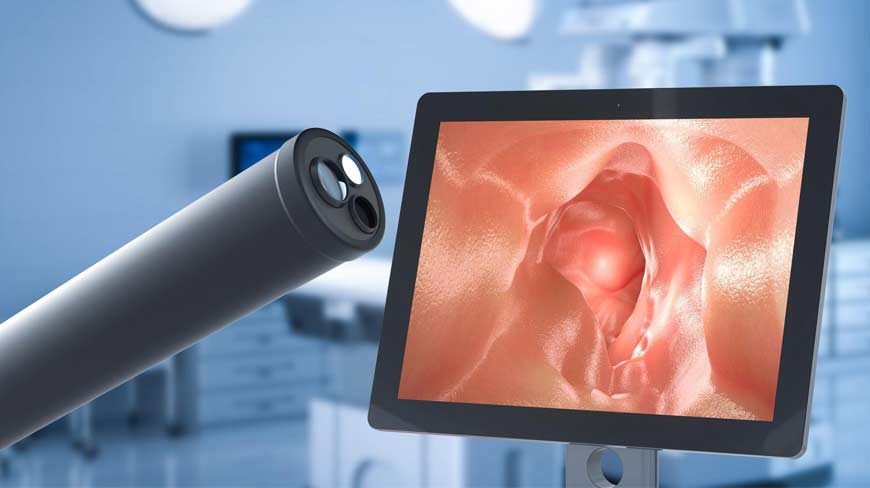5 Reasons You May Need a Colonoscopy
(Leer en español)
Getting screened for colon cancer is one of the most important ways you can take charge of your health. A colonoscopy is the only cancer screening test that both prevents and detects cancer. A colonoscopy can save your life, and it may be time to schedule one.
Do You Need a Colonoscopy?
It’s time to schedule a colonoscopy if:
1. You’re Older Than 45
As you age, your risk of developing colon cancer increases. It’s much more common after 45, though younger adults can be diagnosed. Colon cancer is on the rise among those younger than 45, and the reason for this is unclear.
2. You Have a Personal History of Colon Polyps or Cancer
A history of adenomatous polyps (adenomas) increases the risk of developing colon cancer. This is especially true for those who have had large polyps, many polyps, or if any of them show dysplasia. After polyps are found and your results determined, your gastroenterologist will recommend a screening schedule based on your individual risk. If you’re overdue, schedule an appointment today.
Those who have survived colon cancer, even if it was completely removed, are more likely to develop new cancers in the colon. Those who had their first colorectal cancer when they were younger are even more likely to develop new cancers. If you’ve been diagnosed with cancer in the past, talk with your oncologist or gastroenterologist about your colonoscopy screening schedule.
3. You Have a Family History of Colon Polyps or Cancer
Though most colon cancers are found in those without a family history, as many as one-third of people with colon cancer have family members who also had it.
Having a first-degree relative (parent, sibling, or child) with a history of colon cancer increases the risk. That risk is even higher if the first-degree relative was diagnosed when they were younger than 50 or more than one first-degree relative has had colon cancer.
Higher colon cancer risk is also linked to having family members who had adenomatous polyps, the types of polyps that can turn into cancer.
It’s not entirely clear why this is. Cancers can occur in families because of genes, environmental factors, or a combination.
Those with a family history of adenomatous polyps or colon cancer should talk to their doctors about when to start screening. It’s possible they’ll need to begin colon cancer screening before age 45. Those who have had adenomatous polyps or colon cancer should tell their close relatives so they can tell their doctors, who can recommend when screening should start.
4. You Have a Personal History of Inflammatory Bowel Disease
Having inflammatory bowel disease (IBD), like ulcerative colitis or Crohn’s disease, increases the risk of colon cancer. IBD is not the same as irritable bowel syndrome (IBS); IBS doesn’t appear to increase colon cancer risk. Those with IBD may need to start colon cancer screening earlier and be screened more frequently.
5. You Have Colon Cancer Symptoms
Though early colon cancer generally doesn’t have any symptoms, those experiencing these symptoms should see a gastroenterologist:
- Blood in the stool
- Unexpected weight loss
- Rectal bleeding
- Abdominal pain
These symptoms don’t automatically mean colon cancer, but a colonoscopy can help diagnose some gastrointestinal problems.
Lifestyle-related Colon Cancer Risk Factors
Some colon cancer risk factors are lifestyle-related and can be changed. According to the American Cancer Society, diet, weight, and exercise are closely linked to colorectal cancer risk — and they’re the strongest link for any type of cancer.
Lifestyle-related colon cancer risk factors include:
Being Overweight or Obese
Those who are overweight or obese have a higher risk of developing and dying from colon cancer. Though being overweight increases the risk of developing colon cancer in both men and women, the link between weight and developing colon cancer seems to be stronger in men. If you’re overweight and want help changing your diet, a registered dietitian can help.
Being Sedentary
Those who aren’t physically active have a greater chance of developing colon cancer. The American Cancer Society recommends that adults get up to 300 minutes of moderate-intensity exercise or up to 150 minutes of vigorous-intensity or a combination of physical activity each week.
Eating a Certain Diet
Dietary choices can contribute to the risk of developing colon cancer. Eating a lot of red meats (like beef, pork, or lamb) or processed meats raises the risk.
Preparation matters, too. Frying, broiling, grilling, or other methods of cooking meats at high temperatures creates chemicals that may raise the risk.
An insufficient amount of vitamin D in the blood may also raise the risk.
Eating a healthy diet with plenty of fruits, vegetables, and whole grains while reducing or avoiding red and processed meats and sugary drinks likely lowers the risk.
Being a Smoker
Those who are long-term tobacco smokers are more likely than non-smokers to develop and die from colon cancer. Smoking is linked to many more cancers than just lung or colon. If you smoke and want to learn about cessation, the Texas Tobacco Quitline may be able to help.
Being a Moderate or Heavy Drinker
Moderate to heavy alcohol use has been linked to colon cancer. Even light drinking has been shown to increase the risk of developing colon cancer. It’s best to completely abstain. If people do drink, men should have no more than two drinks per day and women should have no more than one. The health benefits of reducing alcohol intake include lowering the risk of many kinds of cancer.
Whether you’re ready for your first colonoscopy or it’s time for your next colonoscopy, we can help. Schedule an appointment today.
Request Appointment
Related:


